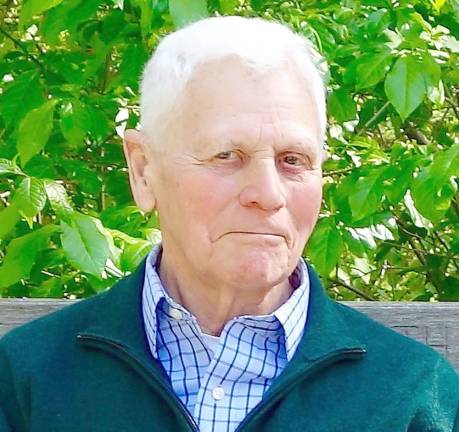Dr. Douglas Gordon Potts died peacefully on Saturday, March 6, 2021. He was 94.
Gordon, as he was known to family and friends, was born in Otahuhu, New Zealand. His parents, Leslie and Vera Potts, named him in honor of Leslie’s “cobbers,” Douglas and Gordon, who saved Leslie’s life on a battlefield in France during World War I.
Gordon was a resident of Sparta, N.J., at the time of his death. He moved from New Zealand to England to the United States to Canada and back to the United States because, as he told the story, he could never hold a steady job. Regardless of his many accomplishments in the field of neuroradiology, Gordon preferred to introduce himself as “an old dairy farmer from New Zealand.”
Gordon prioritized education throughout his life. He earned the top male student award upon promotion from primary school, which he claimed was the only prize he ever won. His education continued at Canterbury University College followed by University of Otago Medical School. After a residency in diagnostic radiology at Auckland Hospital, Gordon planned for further neuroradiology training and cleverly secured paid travel to London as an official crew member (doctor) on a cargo ship, earning “the Queen’s shilling” (14 cents a month) during the passage.
Following his formal training in London at Atkinson Morley Hospital and the National Hospital for Nervous Diseases (Queen Square), Gordon emigrated to the U.S. to teach and practice at the Neurological Institute at Columbia Presbyterian Medical Center in New York City. During this tenure, Gordon married Ann Jean Frank, a physiotherapist at the hospital, and their marriage was blessed with three children. A few years later, Gordon was recruited downtown by The New York Hospital-Cornell Medical College, appointed professor of radiology and chief of neuroradiology, and procured for the hospital one of the three original CT scanners produced. His final career move brought him to Canada as the appointed chair of radiology at the University of Toronto, overseeing nine hospitals and unifying multiple diverse radiology training programs.
Throughout his life, Gordon was a passionate researcher, inventor, author, clinician, and leader. He helped many patients from all walks of life, those who entered through clinic doors and those he encountered in his everyday travels. He felt lucky to continue to learn from people of diverse backgrounds throughout his life, especially those with experiences different from his own. He easily engaged in conversation with great interest on any topic with everyone he met. Gordon relished the collaboration with his academic colleagues, many of whom won Lasker Awards and Nobel Prizes, but equally cherished the advice and expertise of the local hardware store purveyor, whose consultation he sought dressed in a jacket and tie every time.
Gordon was a founding member of the American Society of Neuroradiology and served a term as president. With Hans Newton, Gordon co-edited the five volume series of textbooks, Radiology of the Skull and Brain, considered the definitive work in this field and fondly known as “Newton and Potts.” Ever the researcher, Gordon was always studying how-to books and service manuals, and famously multitasked by reading chapters on diesel engine repair to his children for their bedtime story. His inventions included the Potts needle used for arteriography and the somersaulting Potts Chair for cerebral pneumoencephalography. An even more extraordinary accomplishment was Gordon’s transformation of his rusted station wagon, whose gas tank he patched with chewed bubble gum, into a crane used for a seawall repair before retiring the car into service as a boat trailer.
Following the death of his wife, Ann, Gordon retired to the United States to Shelter Island, N.Y., where he continued his research closer to his farming roots, in aquaculture, through participation in a Cornell University program that restores oysters to the bay, and by “improving the land.” His great joys of retirement included his constant home and property projects, amassing a truly impressive compost pile, and being a founding member of the ROMEOs (Retired Old Men Eating Out). Aligned with his tendency to move between continents and also gravitate toward warmer temperatures (inside and out) as he got older, he spent most winters on Doubtless Bay in New Zealand, where he continued to work the land, catch fish for dinner, and find any excuse to drive his favorite vehicle, the tractor.
Gordon regarded his New Zealand education as outstanding and fully up to the standards in the United States, England, and Canada. During his retirement, Gordon founded The Moor Trust to specifically fund the connection and collaboration of young New Zealand neuroradiology and radiology trainees with the most innovative leaders in the field from around the world, and humbly named it for his original mentor and fellow New Zealander, Dr. Stephen Moor.
Gordon was predeceased by his beloved wife of 32 years, Ann Frank Potts. A second marriage ended in divorce. He is survived by his children, David Potts (Elizabeth) of Lyme, Conn., Ken Potts (Kathleen) of Sparta, and Alison Potts Bleakman (David) of New York, N.Y. He is also survived by six grandchildren, Alison, Emily, Morgan, Caroline, Trevor, and Ashley Potts; and his granddogs, Rory and Tinker, all of whom brought him much joy. Gordon was immensely proud of his children and grandchildren, despite none becoming medical doctors (yet).
Gordon wanted his family and friends to celebrate happy memories rather than mourn his passing. Private arrangements have been made for a celebration of his life according to his wishes.
If desired, donations can be made in memory of Dr. Douglas Gordon Potts to The Foundation of the ASNR, International Outreach Professor Program or Neurological Foundation Human Brain Bank.
